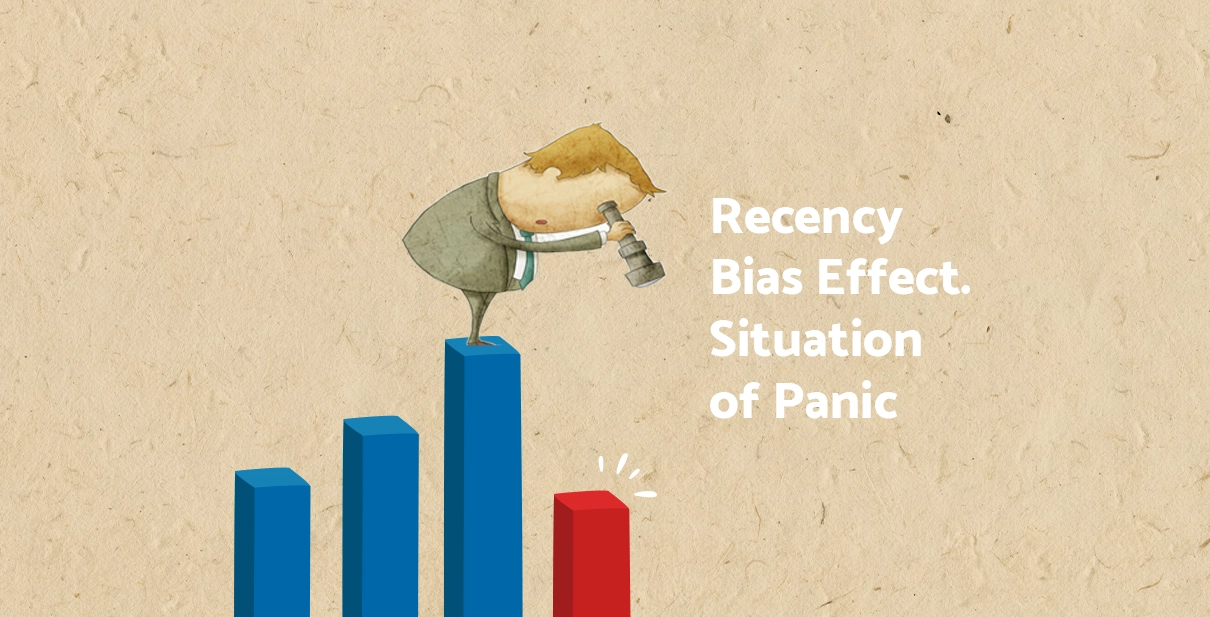- May 30, 2017
- by Prakash Lohana
- Articles
- 473 Views
- 1 Comment
If I ask you to recall name of 10 people you met this month, whom do you recall? Just observe, mostly you will recall name of 10 people whom you mate recently. This is recency effect. Similarly, if I ask you for opinion on behaviour or performance of any of your colleagues or employees kindly observe how you give your opinion and what affects your opinion maximum, Most of the time their recent behaviour or performance will influence your opinion. If one of your colleagues was very polite and humble since beginning of your relationship but has not behaved well recently, your opinion will move towards negative side or if any of your employees has not performed well recently then your opinion on his performance will not be good even though he has been performing well since beginning. So your recent experience affects your opinion the most. This is recency Bias. Events which occur recently have maximum impact on your mind.
Recency Bias is one of the most common biases affecting our investment and other life decisions. Here we remember the events which happen recently or information which we received recently. Also the events which took place recently or information which came last affects our decisions maximum.
Let me give you one more example, Say if from tomorrow you have to go for some project or work to a city which is two hour from your city by train for next one month and I ask you that what are the chances that train comes by time in India? What will be your answer? When I ask this question in my seminars most of the people have answer in the range of 70% to 90%. So they believe that out of ten times 7 to 9 times train will be on time. Now if suppose your answer is 70% you believe that out of 10 times you travel, 7 times train will be on time. Suppose you have to travel from tomorrow and you have to catch a train that arrives at 7.30 a.m. and departs at 7.35 a.m. You reached station by 7.25 and announcement was made that train is late by 90 minutes. Second day again you reach station by time and train is late by 70 minutes, Third day again you reach by time but train is late by say 2 hrs. Now I meet you on platform you are very frustrated and angry and I ask you the same question that what are the chances that in India train comes by time? What will be your answer? Mostly the answer that comes is in the range of 0% to 30%. Now observe what happened here, earlier when you said 70% chances are there, it came from your subconscious mind and this registered slowly form your childhood when you started travelling but these last three days experiences changed your answer totally and dominated your decision making behaviour. This same thing happens in Investment decisions as well as other decisions of life.
When it comes to investing people invest in the instrument which have done excellent recently. Particularly if you will see in stock market maximum investment comes when markets are at peak.

Above chart gives data from Oct-99 to March-2017, red line shows Sensex levels where as black line indicates gross mutual fund investments. The chart clearly shows that whenever markets are doing very good and going high, investments in equity funds sharply rise and vice versa. So most of the times investors invest when equity market is very high and stay away from markets when markets have fallen sharply. This behaviour is seen universally. The reason behind this behaviour is recency effect. When markets goes up and up the returns of equity mutual funds are very good in recent past so investors look at recent past and start investing in equity. Here subconscious mind starts believing that this behaviour of markets will continue and they will make good returns so investment at these points increases. Similarly when markets fall they the recent past is not good so they start believing that markets will fall further so they avoid investing more money in equity.
How Recency effect creates illusion of Safety & illusion of Risk?
Actually recency effect creates illusion of safety & illusion of risk in the minds of investors. Let me show you with a historical example.

In January-2008, when Sensex first time touched 21000 levels it was all time high and in last one year ( from Jan-2007 ) to Jan 2008 Sensex had moved up from 14000 levels to 21000 levels so it was rise of around 50%. In this month (January -2008) equity mutual funds had highest net inflow from investors of Rs. 13678 crores in one month. Here at this point Sensex had gone up by around 50% in one year but economy (corporate profitability ) had not grown by even 20% and no economy can grow by 50% in one year so at this point markets were extremely overvalued and risk reward ratio was unfavourable. But due to recency effect investors start feeling very comfortable and forgot to consider risk of overvalued market on the contrary they start believing that this will continue so here there is illusion of safety. There was no safety at 21000 Sensex levels but there was illusion of safety. This behaviour of investing more money at higher market levels created a bubble in stock market and what happened next we all know. On the other side when markets started falling immediately after this and saw the bottom Sensex levels in Mar-2008 ( when Satyam fraud came out) of around 8344 the net investment in equity mutual funds was around Rs. 544 crores only, which was not even 10% of what came in Jan-2008. Here markets had fallen by around 61% so ideally there was hardly any risk because economic activity in the country or corporate profitability had not fallen by even 5% which shows that markets were undervalued and risk reward ratio was favorable but unfortunately those investors who were ready to buy equity at 21000 Sensex levels were found equity markets costly at 8300 Sensex levels and were not ready to buy equity. Isn’t this a strange behaviour ? Yes but the reason is at 8300 Sensex levels actually there was not risk, whatever worst could happened had already happened but as the recent past was negative there was illusion of Risk. There was not actual risk but there was illusion of risk only.
Both these behaviours were irrational in nature those who invested more money at 21000 levels in Jan-2008 had increased their avg. Purchase price as a result of which they could not make money for next few years and saw negative returns in next one year. Similarly those who were not investing or redeeming their money from equity funds at 8300 level in Mar-2009 could not gain out of the rising market in 2009-10 because the fall was an opportunity to reduce their average purchase price in equity but they lost it and the opportunity was gone. Ideally they should have behaved exactly reverse of their actual behaviour. But recency effect did not allow this.
Recency Effect in Real Estate: Recency effect is not only seen in equity investing but also in real estate investing. From 2005 onwards real estate prices in India and particularly Gujarat started moving up, as a result we saw that those who invested in properties between 2005 to 2007 got good returns by 2009 and at this time equity market had fallen sharply so at this point of time real estate investment had given very good returns and equity investment had not given good returns in recent past. As a result investors started investing in real estate more and more money and this behaviour again repeated what had happened in stock market in 2007. By 2012 property prices went up sharply. Maximum investment happened in 2012 and after that property prices in most of the regions have fallen or art stagnant from last five years. Those who bought properties in 2005 had multiplied their money by four to five times by 2012 so ideally they should have sold their properties and booked profit but they behaved exactly reverse and bought more properties in 2011 & 12. So this brought up their average purchase price up towards the prices of 2011-12 and lost the golden opportunity to book profits.
Recently, after demonetization markets have gone up by around 15% to 20% in just 5 months and as a result recent past is very positive and once again investors are investing in equity. So be careful while taking your investment decisions try to avoid impulsive investing.
To conclude with, recency bias is the most common and frequent bias affecting our Investment decisions. So to take rational decisions we have to learn how to keep our decisions free from recency effect. Following are few suggestions which I recommend you to adopt to keep yourself away from recency bias.
Read History:It is said that history repeats itself. So keep reading history of stock markets and investments. Every few years market cycles are repeated and investors make same type of mistakes. Every time when the market is high, the hopes are at peak and due to recency effect investors believe it will keep going high because this time it is different and markets will do very good. Sir John Templeton had said that “The four most dangerous words in investing are: ‘this time it’s different.'” My advice is whenever someone says this time is different, please run away from there. Don’t litsen him more. Reading history will help you to think from the other side and get away from current fancy market rises or falls and you will do rational things.
Delay your decisions by 2 to 3 days: Whenever recency effect is at peak you will feel tempted to take your investment decisions either buying at peak of market or selling at bottom of market after sharp falls. Try to avoid your decision for 3 days. Let 72 hours to pass and your emotions will calm down and you will be able to rationally.
Adopt process and strategies in Portfolio management: Your investment decisions (whether buying or selling) should not be based on current market events or news. It should be based on long term strategies like asset allocation and rebalancing. Those who don’t adopt strategies are actually adopting tactical money managers.
Is this Rational? : Whenever you find this type of situation where any asset class whether it is equity or real estate is performing on extreme sides (extremely good or extremely bad), before taking any buying or selling decisions just ask yourself “is this rational?” “Whether this continues rise in equity is rational?” Means is it supported by rise in profitability or when markets falls sharply try to find whether profitability of the companies have fallen that much or not? This is real logical thinking process and will lead you to rational and correct decisions.


1 Comment